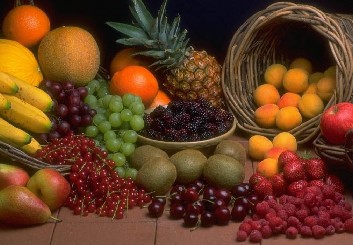



by Dover CliftonHow do animals know which foods to eat? They obey to the following law:
Foods must be:
- Pleasing to see
- Pleasing to taste
When eaten:
- Raw
- Without seasonings
- Without combinations
I know some of you will say that grains and legumes are too hard and do not taste really good, unless we cook and season them. My answer to that is that Nature gave us the sense of taste in order for us to know the good foods from the bad ones. Any food that is not pleasing to the sense of taste is not a good food for us. So an edible that is not tasty in its raw, natural state, is not a natural food for us. Of course we can eat it, after cooking and adding seasonings to it, but that way we are messing up with our own health. By following this rule, of eating everything raw, we will be forced to ingest only natural foods, which comprise all those that taste good in their unadulterated state.
All true heath experts are opposed to grain products. These include bread, pasta, rice, flour, cookies, crackers, etc. It seems very difficult for most people to understand this subject, because unconsciously they refuse to abandon the habit of eating bread and other grain products. Those who call themselves nutritionists and still promotes grains, raw or cooked, are not true health specialists. They don't understand that Nature doesn't produce bread, and that grains are meant to be eaten by birds, who are graminivores, and that humans are frugivores (also eaters of green leaves). There are many reasons why grains are not suited for humans. One of the most valid ones are those taken from the science of biology: the same type of arguments that vegetarian use to condemn meat.
The compared chart of anatomy reveals that humans have none of the characteristics of the carnivore. They do not have appropriate teeth to bite the prey, not an adequate liver to neutralize all the toxins, and so on. Everybody can understand this easily: humans are not carnivores. But what I say is that humans are not graminivores either. We are not biologically designed to eat grains. For every class of animals on the planet, Nature has provided a certain category of foods for them. Any deviation from that will create all sorts of problems: disease, cancer, etc.
A machine that is supposed to function well with a certain type of oil will not function as well with a different type of oil. It will clog up and break down. This is the major argument against grains. All other "scientific" arguments, are only about details.
Nature has provided a special type of foods for the fish, another type of food for the cows, and something entirely different for the bears. And for us, Nature provides us with our natural food: fruits, green leaves, and maybe roots.
Nature is no chaos. Every species eats the food it was designed to eat. If horses would start eating meat, and lions start grazing with the cow, it would be the end of everything!
The gizzard
Bread and grains, even whole grains, are extremely deficient in minerals, compared to fruits and greens. They're lacking in alkaline minerals like calcium. They are indeed some of the most acid-forming foods. Our physiology is not designed to handle the digestion of grains. The ptyalin enzyme in our mouth can only handle a small amount of starch (found in roots). Species that are graminivores (eaters of grains), like some types of bird, have a special stomach called the gizzard. What is a gizzard? It's a sort of second stomach that permits certain types of bird to grind hard seeds in order to digest them. With that type of strong stomach, they can even pulverize little rocks in no time. They swallow rocks to help grinding grain. Even needles, swallowed by some young birds, are broken into pieces, and rejected with no apparent damage.
Have you ever seen chickens and other types of fowl eating rocks, nails, and other hard and indigestible things? At that moment, you probably asked yourself: why are these animals eating these useless and harmful things? Have they gone mad? Or are they simply obeying to their instinct? They are simply looking to introduce in their gizzard hard things, to help grind the hard seeds, that they just ate right before.
Birds and fowl have no teeth. That's why they have to swallow whole seeds. But since they need to digest them, Nature provided them with a most perfect grinding machine, attached to their stomach. Small rocks, when eaten, are used as millstones.
But humans are much different. They do not have a gizzard. They cannot grind hard seeds like grains or legumes. That is why those food are not meant to us.
Now someone will say that we can replace the gizzard with a millstone, constructed by humans, and cook the grains, to soften them and render them easy to chew and digest; and that's about what we've been doing for a couple thousands years. But this does not solve the problem.
The digestive tract of humans, and of all frugivous animals, is too long for an adequate digestion of starches. These foods stay there for too long, an thus have a tendency to ferment. Grains are natural foods for birds and fowl, but not of humans, who are not equipped with a gizzard and other physiological designs, in order to process grain properly.
Furthermore, these foods cannot be eaten and enjoyed in their natural state, they are not foods we are biologically meant to eat. Every food that is a natural food for us must be eaten and enjoyed in its raw, unadulterated state. Our natural foods are fruits and green leaves.
Click Here For Your Free Diet, Health and Fitness Tips Magazine
[Home] [Articles] [Cuisine] [Recipes] [Resources] [Links]
© 1999-2021 SunFood.net